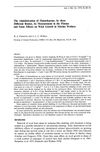 47 citations,
August 2000 in “Endocrine Reviews”
47 citations,
August 2000 in “Endocrine Reviews” The document concludes that more research is needed to understand excessive hair growth in women with normal hormone levels and regular ovulation.
 23 citations,
February 2021 in “Journal of Endocrinological Investigation”
23 citations,
February 2021 in “Journal of Endocrinological Investigation” Betacoronaviruses, like COVID-19, may cause hormone system dysfunction and affect disease susceptibility and severity.
[object Object]  23 citations,
October 2006 in “Journal of Investigative Dermatology”
23 citations,
October 2006 in “Journal of Investigative Dermatology” Men with baldness have higher levels of specific proteins, suggesting local hormone production may play a role in hair loss.
 21 citations,
January 2020 in “General and Comparative Endocrinology”
21 citations,
January 2020 in “General and Comparative Endocrinology” Lack or blocking of SRD5a, a key component in hormone creation, can lead to conditions like pseudohermaphrodism and affect hair growth, bone mass, muscle strength, and reproductive health. More research is needed on its regulation from fertilization to adulthood.
 21 citations,
November 2015 in “Archives of Gynecology and Obstetrics”
21 citations,
November 2015 in “Archives of Gynecology and Obstetrics” Greek women with PCOS have a higher risk of metabolic syndrome and are more likely to be overweight compared to healthy controls.
 15 citations,
January 2015 in “Clinical and Experimental Reproductive Medicine”
15 citations,
January 2015 in “Clinical and Experimental Reproductive Medicine” Taiwanese women with PCOS experience different symptoms based on age, with younger women facing more hormone imbalances and older women dealing with more metabolic issues.
 14 citations,
January 1990 in “Fertility and Sterility”
14 citations,
January 1990 in “Fertility and Sterility” Some patients with high prolactin levels don't show symptoms because they have a form of the hormone that's less active.
 11 citations,
February 2016 in “Current Medicinal Chemistry”
11 citations,
February 2016 in “Current Medicinal Chemistry” New treatments for prostate cancer and BPH show promise, including novel compounds that target hormone synthesis and response.
 5 citations,
November 1999 in “Medical Hypotheses”
5 citations,
November 1999 in “Medical Hypotheses” Minoxidil, a common hair loss treatment, might work by counteracting a hormone that reduces hair growth and promotes hair loss.
 1 citations,
May 2017 in “InTech eBooks”
1 citations,
May 2017 in “InTech eBooks” Hair loss in Androgenetic alopecia (AGA) is due to altered cell sensitivity to hormones, not increased hormone levels. Hair growth periods shorten over time, causing hair to become thinner and shorter. This is linked to miscommunication between cell pathways in hair follicles. There's also a change in gene expression related to blood vessels and cell growth in balding hair follicles. The exact molecular causes of AGA are still unclear.
 150 citations,
November 2007 in “The Journal of Clinical Endocrinology and Metabolism”
150 citations,
November 2007 in “The Journal of Clinical Endocrinology and Metabolism” About 2.2% of women with symptoms of high male hormones have a mild form of congenital adrenal hyperplasia, and measuring a specific hormone level can accurately diagnose it.
 117 citations,
May 2017 in “Human Reproduction Update”
117 citations,
May 2017 in “Human Reproduction Update” The update highlights that non-classic congenital adrenal hyperplasia is common in women with excess male hormones, requires specific hormone tests for diagnosis, and has various treatment options depending on age and symptoms.
 43 citations,
November 2019 in “American Journal of Clinical Dermatology”
43 citations,
November 2019 in “American Journal of Clinical Dermatology” FAGA diagnosis uses blood tests and trichoscopy, with treatments like topical minoxidil, oral anti-androgens, and hormone-modulating drugs.
 34 citations,
March 2020 in “BMC plant biology”
34 citations,
March 2020 in “BMC plant biology” Graphene oxide and indole-3-acetic acid together inhibit root growth in Brassica napus L. by affecting multiple plant hormone pathways.
 5 citations,
March 2020 in “Current Opinion in Endocrine and Metabolic Research”
5 citations,
March 2020 in “Current Opinion in Endocrine and Metabolic Research” Skin problems in PCOS, like excess hair, acne, and hair loss, may not always indicate high male hormone levels and need careful diagnosis for proper treatment.
 1 citations,
November 1996 in “Journal of Cutaneous Medicine and Surgery”
1 citations,
November 1996 in “Journal of Cutaneous Medicine and Surgery” Hormones, especially androgens, play a key role in causing acne, and treatments like hormone control pills and hormone-blocking medications can help.
 14 citations,
June 2013 in “Joint Bone Spine”
14 citations,
June 2013 in “Joint Bone Spine” ACTH may be an effective first-line treatment for acute calcium pyrophosphate crystal arthritis.
13 citations,
March 2012 in “The American Journal of Surgery” Modified laparoscopic sleeve gastrectomy effectively controls diabetes and treats obesity with minimal complications.
 5 citations,
October 2021 in “Signal Transduction and Targeted Therapy”
5 citations,
October 2021 in “Signal Transduction and Targeted Therapy” Stress hormone corticosterone suppresses hair growth by affecting stem cell activity and Gas6 protein expression.
 205 citations,
July 2009 in “Journal of Dermatological Science”
205 citations,
July 2009 in “Journal of Dermatological Science” Male and female skin differ in many ways, which could lead to gender-specific skin treatments.
[object Object]  51 citations,
March 2004 in “Hormone and Metabolic Research”
51 citations,
March 2004 in “Hormone and Metabolic Research” Women with Polycystic Ovary Syndrome have higher levels of the hormone ghrelin, which may be linked to the cause of the condition.
 16 citations,
July 2002 in “JOGC/Journal of obstetrics and gynaecology Canada”
16 citations,
July 2002 in “JOGC/Journal of obstetrics and gynaecology Canada” Birth control pills can help reduce mild to moderate acne in women.
 9 citations,
January 1978 in “Australian Journal of Biological Sciences”
9 citations,
January 1978 in “Australian Journal of Biological Sciences” Flumethasone causes wool shedding in Merino wethers, with recovery in about 60 days.
 November 2021 in “International Journal of Immunology and Microbiology”
November 2021 in “International Journal of Immunology and Microbiology” Thyroid hormone imbalances can cause hair loss in alopecia patients.
October 2004 in “Veterinary dermatology” Veterinary Dermatology improved its impact and ranking, expanded content, planned online submissions, and emphasized the need for better-designed clinical trials.
 277 citations,
July 2002 in “Molecular Endocrinology”
277 citations,
July 2002 in “Molecular Endocrinology” Removing part of the vitamin D receptor stops vitamin D from working properly.
 220 citations,
August 1988 in “Clinical endocrinology”
220 citations,
August 1988 in “Clinical endocrinology” Melatonin may help with sleep issues, depression, and cancer, but more research is needed.
 187 citations,
December 2005 in “Experimental Dermatology”
187 citations,
December 2005 in “Experimental Dermatology” Estrogens can improve skin aging but carry risks; more research is needed on safer treatments.
 128 citations,
September 2011 in “British Journal of Dermatology”
128 citations,
September 2011 in “British Journal of Dermatology” Obesity is linked to various skin problems and may increase the risk of skin cancer.
 107 citations,
August 2002 in “Journal of Neurology, Neurosurgery, and Psychiatry”
107 citations,
August 2002 in “Journal of Neurology, Neurosurgery, and Psychiatry” Women with epilepsy should be monitored for reproductive issues, which can be caused by epilepsy or its treatments, especially when using valproate.




























